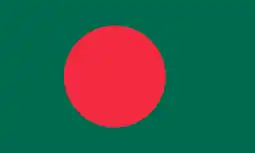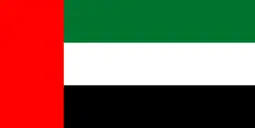TRG-300 Tiger
The TRG-300 Tiger[3] (also known as TRG-300 Kasirga) is a Turkish guided multiple launch rocket system manufactured by the ROKETSAN corporation.[4] The system has four 300 mm rocket launcher tubes and its rockets can hit a maximum range of 120 km.[4][5]
| TRG-300 Tiger | |
|---|---|
.JPG.webp) TRG-300 Kasirga rocket system | |
| Type | Rocket artillery |
| Place of origin | |
| Service history | |
| Wars | 2020 Nagorno-Karabakh war [1] |
| Production history | |
| Manufacturer | ROKETSAN |
| Produced | 2000 – present |
| Variants | See Variants |
| Specifications | |
| Caliber | 300 mm (12 in) |
| Barrels | 4 |
| Elevation | 0–60° |
| Traverse | 360° |
| Maximum firing range | 120 km (75 mi) |
| Warhead | High explosives + Steel ball |
Detonation mechanism | Point Detonating and Proximity [2] |
| Propellant | Composite solid |
| Flight ceiling | 30.000 feet |
| Maximum speed | Mach 4.8 |
Guidance system | GPS + GLONASS aided INS[2] |
| Accuracy | ≤ 10 m [2] |
Launch platform | MAN 6x6 truck |
Synopsis
.JPG.webp)
Typical Tiger battery systems are composed of a Command and Control Vehicle with between six and nine launcher vehicles (F-302T) and an equal number of resupply and reloading vehicles.[4] TRG-300 Missile can be launched from ROKETSAN Multi-Barrel Rocket Launcher and other platforms with compatible interfaces.[3] Each rocket has four fixed fins and reaches a maximum flight altitude of 30,000m with a maximum speed of Mach 4.2. The rockets use a composite solid propellant system (HTPB) and are usually fitted with a Blast Fragmentation warhead consisting of 26,000 steel balls. The system has aerodynamic control with electromechanical actuation system.[2]
The TRG-300 Tiger MBRL [6] is based on Chinese WS-1 (Wei Shi; Guardian), with some modifications on the design with launcher very similar to the WS-1B 's launcher. In Turkish land forces service, the 300 mm TRG-300 Tiger MBRL system provides long range fire support.
The TRG-300 Tiger MBRLS consists of two key parts: The launcher system (T-300) and the rocket, TRG-300. The T-300 MBRL is based on the German MAN Diesel (6×6) 26.372 10t cross-country truck chassis. Combat weight, complete with four rockets, is 23t. The launcher vehicle's cabin windows are provided with shutters which are lowered before the rockets are launched.
This MAN (6×6) also serves as T-122 launch platform for Turkish land forces command F-302T.
History
In 1997, an agreement was signed with CPMIEC (Chinese Precision Machinery Import and Export Company) for the joint development and manufacture of an offshoot of the WS-1 system. The Kasirga system was first commissioned in the year 2000.
In 2016, the TRG-300 Tiger system was sold to Azerbaijan.[4]
In March 2019, ROKETSAN secured a contract to supply a regiment of medium-range guided multiple rocket launchers to Bangladesh.[7] According to the statement given by the Bangladesh Chief of General Staff Gen.18 units have been delivered to the Bangladesh Army in June 2021.[8]
Variants
Block I
Block I has greater range with smaller warhead than Block II:[3]
- Range: 30 – 120 km
- Weight: 585 kg
- Warhead weight: 105 kg
- Warhead effective radius: ≥ 70 m
Block II
Block II has enhanced warhead dynamic effectiveness:[3]
- Range: 20 – 90 km
- Weight: 670 kg
- Warhead weight: 190 kg
- Warhead effective radius: ≥ 80 m
Operators
 Azerbaijan: 20 units[4]
Azerbaijan: 20 units[4] Bangladesh: 6-18 units (sources vary)[9][10]
Bangladesh: 6-18 units (sources vary)[9][10]
 Turkey
Turkey United Arab Emirates:3 units.[11]
United Arab Emirates:3 units.[11]
References
- "Missiles, rockets and drones define Azerbaijan-Armenia conflict". The Jerusalem Post. Retrieved 18 October 2020.
- "TRG-300 TIGER Missile(PDF)" (PDF). Roketsan. Retrieved 18 October 2020.
- "TRG-300 TIGER MISSILE". Roketsan. Retrieved 18 October 2020.
- "Turkey supplies T-300 Kasirga rocket system to Azerbaijan". AzerNews. 21 September 2016.
- Gao, Charlie (6 January 2019). "The Big Guns: NATO's 5 Deadliest Rocket Artillery Systems". Center for the National Interest.
- "TRG-300 TIGER Missile « Roketsan". Archived from the original on 2018-11-09. Retrieved 2018-11-09.
- Selçuk Colakoğlu (2019-06-25). "Turkey-Bangladesh Relations: A Growing Partnership between Two Friendly Nations". Washington D.C. Retrieved 2020-06-07.
- "Roketsan To Export Trg-300 Kaplan Missile To Bangladesh". easterntimes. 2021-03-16. Retrieved 2021-05-03.
- "Trade-Register-1971-2022.rft". Stockholm International Peace Research Institute. Retrieved 5 August 2023.
- International Institute for Strategic Studies (2022). "Chapter Six: Asia". The Military Balance. 121 (1): 250. doi:10.1080/04597222.2022.2022931.
- "Trade Registers". armstrade.sipri.org. Retrieved 2021-05-09.